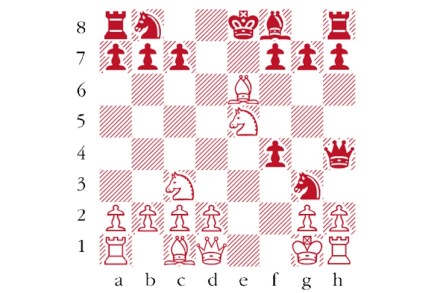No. 617
Black to play. Efimov–Bronstein, Kiev 1941. Normally White seeks glory in the King’s Gambit, but here Bronstein scored a lightning victory for the Black side. Which move did he choose? Email answers to chess@spectator.co.uk by Monday 17 August. There is a prize of £20 for the first correct answer out of a hat. Please include a postal address and allow six weeks for prize delivery. Last week’s solution 1…a4! wins, as 2 Bxe7 axb3 3 Bxd8 Bxb5 4 Bxg5 Bxd3 left Black a piece up. Or 2 Qxa4 Bxb5! hits the queen.Last week’s winner Aaron Milne, Winnington, Cheshire






















